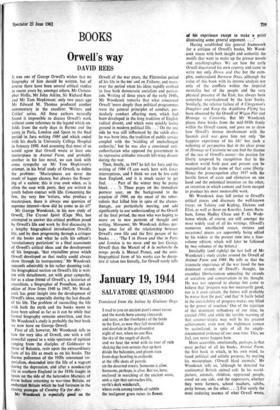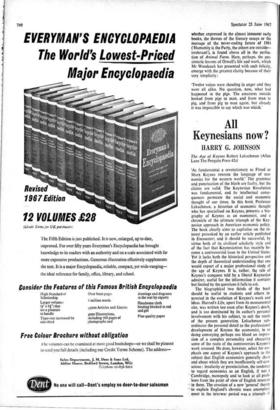Orwell's way BOOKS
DAVID REES
It was one of George Orwell's wishes that no biography of him should be written, but of course there have been several critical studies in recent years by, amongst others, Mr Christo- pher Hollis, Mr John Atkins, Sir Richard Rees and Mr Tom Hopkinson; only two years ago Mr Edward M. Thomas produced another commentary in the excellent 'Writers and Critics' series. All these authors naturally found it impossible to discuss Orwell's work without some reference to the legend which un- folds from the early days in Burma and the years in Paris, London and Spain to the final period in Jura writing 1984 and which ended with his death in University College Hospital in January 1950. And assuming that most of us would agree that Orwell wrote at least one masterpiece in Animal Farm, and probably another in his last novel, we can look with some sympathy on Mr Tom Hopkinson's attempt, in his brief study of Orwell, to define the problem: 'Masterpieces are never the result of happy chance, but always the flower- ing of a nature; this is true even when, as is often the case with poets, they are written in youth before contact with life. Concerning the few, the very few —writers, who produce a masterpiece, there is always one question of supreme interest—how did he come to do it?'
Mr George Woodcock, in his new study of Orwell, The Crystal Spirit (Cape 50s), has attempted to answer this critical problem posed by Orwell's life and work by first discussing in a lengthy biographical introduction Orwell's life, and by then progressing through a critique of the books and what he calls his subject's 'revolutionary patriotism' to a final assessment of Orwell's critical ideas and the development of his language, 'that crystalline prose which Orwell developed so that reality could always show through its transparency.' Mr Woodcock succeeds admirably in his rather daunting task; the biographical section on Orwell's life is writ- ten with detachment, yet with great sympathy, for as a close friend of Orwell's, a historian of anarchism, a biographer of Proudhon, and an editor of Now from 1940 to 1947, Mr Wood- cock has great insight into the development of Orwell's ideas, especially during the last decade of his life. The problem of reconciling the life with both the myth and the books seems to have been solved as far as it can be while that formal biography remains unwritten, and thus Mr Woodcock's study is probably the best book we now have on George Orwell.
First of all, however, Mr Woodcock tells us how the very idea of Orwell, one with a still powerful appeal to a wide spectrum of opinion ranging from the disciples of Goldwater to those of Bakunin, rests upon the extraordinary facts of his life as much as on his books. The Burma policeman of the 1920s renounced im- perialism, descended into the life of a vagrant during the depression, and after a nondescript life in southern England in the 1930s fought in Spain on the side of the heterodox Marxists of Pous4 before returning to war-time Britain, an embattled Britain which he had foreseen in the closing passages of Coming Up for Air.
Mr Woodcock is especially good on the Orwell of the war years, the Fitzrovian period of his life in the BBC and on Tribune, and more- over the period when his ideas rapidly evolved to fuse both democratic socialism and patriot- ism. Writing of these years of the early 1940s, Mr Woodcock remarks that what concerned Orwell 'more deeply than political programmes were the general principles of conduct, par- ticularly conduct affecting men, which had been developed in the long tradition of English radical dissent, and which were quickly losing ground in modern political life. . . On the one side he was still influenced by the sahib class he was born into, the tradition of public service coupled with the 'wielding of unchallenged authority,' but he was also a convinced anti- authoritarian who opposed the government in its repressive attitudes towards left-wing dissent during the war.
Then, finally, in 1947 he left for Jura and the writing of 1984 CI can work here with fewer interruptions, and I think we can be less cold than England, and it is much easier to get fueL . . Part of the winter may be pretty bleak ') These pages on the immediate postwar year, on the background to the creation of 1984, on the onset of the tuber- culosis that killed him in spite of the chemo- therapy, are particularly moving, and add significantly to our understanding of the Orwell of the final period, the man who was hoping to move on to new patterns of thought and writing. Moreover, Mr Woodcock defines per- haps once for all the relationship between Orwell's own life and the first person of his books. . . . 'The I in Down and Out in Paris and London is no more and no less George Orwell than the Marcel of A la recherche du temps perdu is Marcel Proust, and the auto- biographical form of his works can be decep- tive if taken too literally, for Orwell rarely tells of his experience except to make a point illustrating some general argument...
Having established this general framework for a critique of Orwell's books, Mr Wood- cock traces with both insight and authority the motifs that went to make up the prewar novels and autobiographies. We see how the early Orwell discovered his own country and came to
write not only Down and Out but the com- plex, undervalued Burmese Days, although the value of this book with its intense analysis not only of the conflicts within the imperial mentality but of the people and the very physical presence of the East, has always been somewhat overshadowed by the later books. Similarly, the relative failure of A Clergyman's Daughter and Keep the Aspidistra Flying has been obscured by the Orwell of Wigan Pier and Homage to Catalonia. But Mr Woodcock places these books from the mid-1930s firmly within the Orwell canon, and goes on to show how Orwell's intense involvement with the Spanish civil war gave him not only 'the happiest experience of his life' but such a widening of perspective that in the clear prose of Homage to Catalonia we can find the themes of the rest of Orwell's career—the passion for liberty tempered by recognition that in the modern world both past and present can be manipulated in the name of that same liberty. Hence the preoccupation after 1937 with the hostile forces of caste and alienation on one hand and the polemical intention on the other, an intention in which content and form merged to produce his most memorable work.
Mr Woodcock does full justice to Orwell's critical pieces and discusses the well-known essays on Tolstoy and Kipling, Dickens and Eliot, as well as those on Koestler, James Burn- ham, James Hadley Chase and P. G. Wode- house which, of course, are still amongst the most widely read of all his writings. (Orwell's numerous uncollected essays, reviews and occasional pieces are apparently being edited by his widow at the present time into a four- volume edition, which will later be followed by two volumes of the letters.) Inevitably (and rightly) the last half of Mr Woodcock's study circles around the Orwell of Animal Farm and 1984. He tells us that the traumatic experience of the war fused the two dominant strands of Orwell's thought, his anarchist libertarianism annealing the strands of socialism and conservatism in his thought. He was not opposed to change but came to believe that 'progress was not necessarily good, nor is it even certain; the future will probably be worse than the past,' and that 'A facile belief in the inevitability of progress makes one blind to the power of reaction.' Out of the rejection of this dominant orthodoxy of our time, he created 1984, and while the terrible warning of that counter-utopia may well be his greatest achievement, even now the nightmare cannot be assimilated, in spite of all the amply- documented evidence of our own time. This, we feel, can never happen here.
More accessible, emotionally, perhaps, is that most perfect of all his books, Animal Farm, the first book in which, in his own mind, he fused political and artistic purpose, by making his masterpiece. ('Orwell liked animals,' Mr Woodcock tells us, 'although he detested the sentimental British animal cult. In his world- picture, animals, children, oppressed people, stood on one side, and the oppressors, whether they were farmers, school teachers, sahibs, party bosses, on the other. . . .) For surely the most enduring essence of what Orwell wrote, whether expressed in the almost innocent early books, the themes of the literary essays or the message of the never-ending future of 1984 ('Humanity is the Party, the others are outside— irrelevant'), is found above all in the perfec- tion of Animal Farm. Here, perhaps, the pes- simistic lessons of Orwell's life and work, which Mr Woodcock has presented with such felicity, emerge with the greatest clarity because of their very simplicity : `Twelve voices were shouting in anger and they were all alike. No question, now, what had happened to the pigs. The creatures outside looked from pigs to man, and from man to pig, and from pig to man again; but already it was impossible to say which was which.'































 Previous page
Previous page